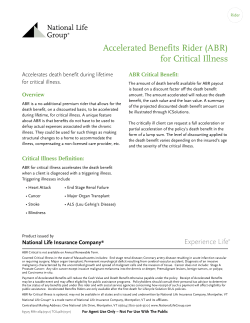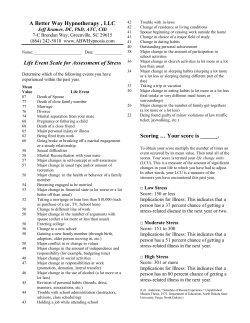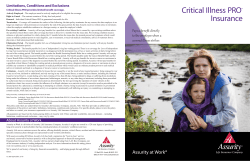
A Common Dilemma Life Insurance Accelerated Benefits Use
Life Insurance Accelerated Benefits Insurance You Don’t Have to Die to Use A Common Dilemma Your job as an advisor is to help your clients meet their financial goals. You help them accumulate assets, and invest those assets wisely. Hopefully, you also help them mitigate the risk of premature death by recommending life insurance. But how do you protect against an unforeseen illness? You don’t want to see all your hard earned assets jeopardized by expensive long-term care costs brought on by a terminal, chronic or critical illness. Americans are living longer. A higher standard of living and medical advances have had a positive effect on mortality.1 But a terminal, chronic or critical illness can result in more people surviving in poor health with an illness that greatly affects lifestyle. So what can you do to help your clients? 1 US National Cancer Institute’s Surveillance Epidemiology and End Results (SEER) Database, revised 2010. 7373 N. Scottsdale Road · Suite A-287 · Scottsdale, AZ 85253 Toll Free: 800-991-6695 Fax: 480-991-8885 Email: info@coregroupusa.com Men have a 1 in 2 lifetime risk of developing cancer during their lifetime, for women the risk 1 is 1 in 3. An Uncommon Solution You can suggest they add a rider to their insurance policy that will also protect them while they are alive from the potential financial impact of a terminal, chronic or critical illness. We call this life insurance you don’t have to die to use. Depending on the carrier, some allow this to be added as a rider, and others have it built into a product. Sometimes there is an additional cost, and other products do not increase in price. Accelerated Benefits Rider (ABR) ABR lets your client access their death benefit, on a discounted basis, should they become terminally, chronically or critically ill. This rider can provide the funds needed to pay any expenses they incur, allowing them to preserve other assets or investments. The use of benefits are not restricted and may be used for any expense including: medical expenses home renovation additional care business expenses travel 7373 N. Scottsdale Road · Suite A-287 · Scottsdale, AZ 85253 Toll Free: 800-991-6695 Fax: 480-991-8885 Email: info@coregroupusa.com Do Your Clients Have Living Benefits? Ian Ian’s doctor has told him he has less than two years to live. Using the Terminal Illness rider, he chooses to access his death benefit to enjoy life to the fullest during his last two years. Sandra Sandra, at age 79, becomes chronically ill and enters a nursing home. Her Chronic Illness rider allows her to help pay for her nursing home stay and other medical expenses. The cost of a semi-private room rose 3.5% in 2010 to an average of $205 a day ($74,825 per year). The cost of a private room rose 4.6% to an average of $229 a day ($83,585 per year). 2 2 US News and World Report, 2010 7373 N. Scottsdale Road · Suite A-287 · Scottsdale, AZ 85253 Toll Free: 800-991-6695 Fax: 480-991-8885 Email: info@coregroupusa.com Do Your Clients Have Living Benefits? Niles Niles, a husband and father of two, suffers a severe heart attack at the age of 54. He is able to use the money from his Critical Illness rider to cover his medical expenses, and pay off his family’s mortgage. Bob & Mary Bob and Mary are parents of college age children. Through policy loans and withdrawals, they are able to use some of their policy’s accumulated value to offset tuition payments.3 Surviving stroke victims face an average of $140,000 in personal costs over their lifetimes.4 Every 45 seconds someone suffers a stroke. 3 Policy loans and withdrawals reduce the policy’s cash value and death benefit and may be a taxable event. Surrender charges may reduce policy cash values in the early years of the contract. 4 American Heart Association: Heart disease and stroke stats, 2009. 7373 N. Scottsdale Road · Suite A-287 · Scottsdale, AZ 85253 Toll Free: 800-991-6695 Fax: 480-991-8885 Email: info@coregroupusa.com When Are Rider Benefits Available? Availability differs by product and carrier, but in general: Terminal Illness – If you are suffering from a terminal illness that will result in death within 24 months, you may elect to accelerate benefits under the rider. Chronic Illness – If you are certified chronically ill by a licensed health care practitioner within the last 12 months, and are unable to perform without substantial assistance, two out of six Activities of Daily Living (ADLs) for a period of at least 90 days, you may choose to accelerate benefits under the rider. The six activities are defined as eating, toileting, transferring, bathing, dressing and continence. Critical Illness – If you suffer a critical illness, such as a heart attack, stroke, a major organ transplant or have been diagnosed with cancer, end stage renal failure or ALS (Lou Gehrig’s disease) or blindness, your benefits can be accelerated. Covered critical illnesses are heart attack (myocardial infarction), stroke, diagnosis of cancer, diagnosis of end-stage renal failure, major organ trans-plant, diagnosis of ALS (amyotrophic lateral sclerosis), or blindness (corrected vision no better than 20/200 in both eyes), to name a few. Talk to your clients about the risks of: 1) Facing a critical illness 2) Facing a chronic illness 3) Living too long How would these events impact their families, and their security? Life Insurance has always helped if a client dies too soon. Now the same policy can help if your client lives too long or becomes chronically ill. With ABR, you can protect your assets, maintain choice and independence and help ensure you will have the funds needed to get the care you need should a terminal, chronic or critical illness strike. Call us today to learn more! 7373 N. Scottsdale Road · Suite A-287 · Scottsdale, AZ 85253 Toll Free: 800-991-6695 Fax: 480-991-8885 Email: info@coregroupusa.com
© Copyright 2025





















